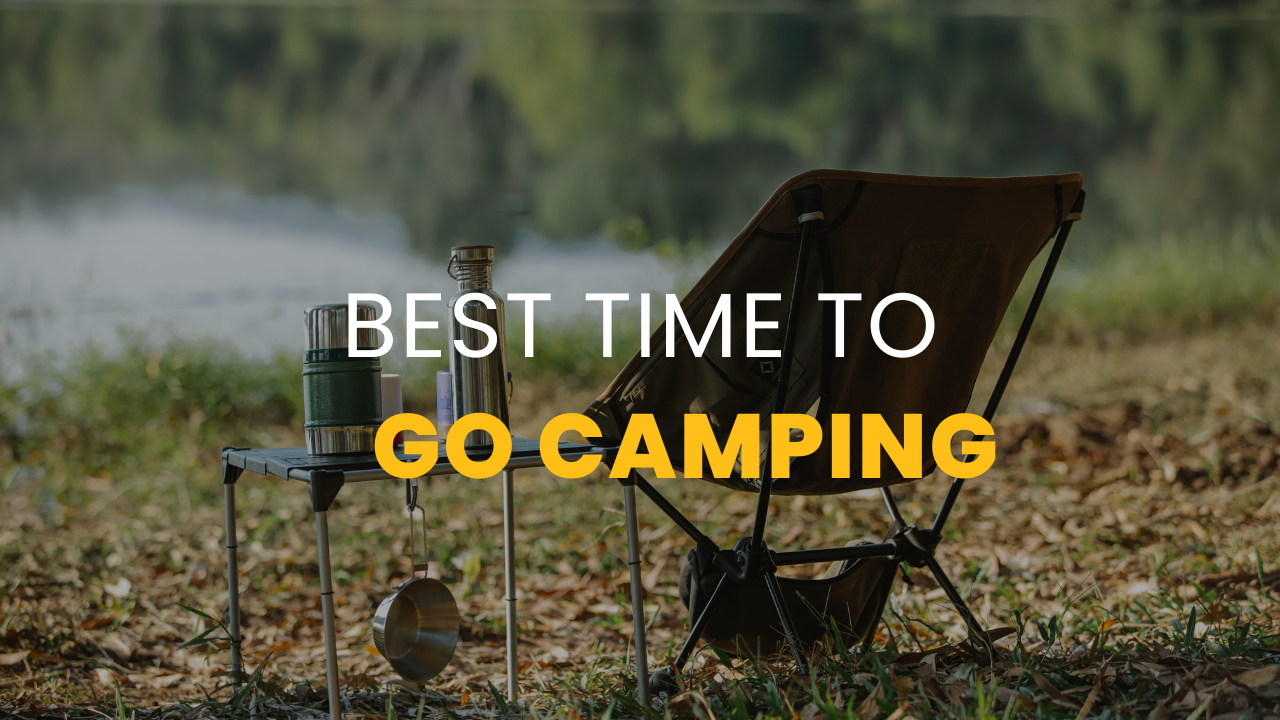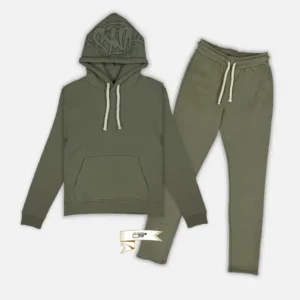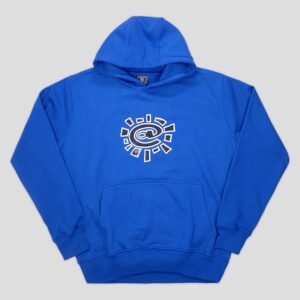Camping is a beloved outdoor activity that allows us to reconnect with nature, unwind from the stresses of daily life, and create lasting memories with friends and family. However, choosing the right time to embark on your camping adventure can significantly impact your overall experience.
In this comprehensive guide, we’ll explore the various factors that influence the best time to go camping, including weather patterns, seasonal considerations, and personal preferences. Whether you’re a seasoned camper or a novice outdoor enthusiast, this article will provide valuable insights to help you plan your perfect camping trip.
Seasonal Considerations for Camping
Spring Camping
Spring camping offers a unique opportunity to witness nature’s rebirth after the long winter months. As temperatures begin to rise and vegetation starts to bloom, spring provides an ideal backdrop for outdoor enthusiasts looking to shake off the winter blues.
Pros of Spring Camping:
- Mild temperatures
- Blooming wildflowers and lush greenery
- Fewer crowds compared to peak summer months
- Opportunity to observe wildlife emerging from hibernation
Cons of Spring Camping:
- Unpredictable weather patterns
- Potential for lingering snow or muddy conditions
- Some campgrounds may not be fully operational early in the season
Spring camping is best suited for those who enjoy mild weather and don’t mind occasional rain showers. It’s an excellent time for activities such as hiking, birdwatching, and photography. However, be prepared for changing weather conditions and pack appropriate gear to stay comfortable in varying temperatures.
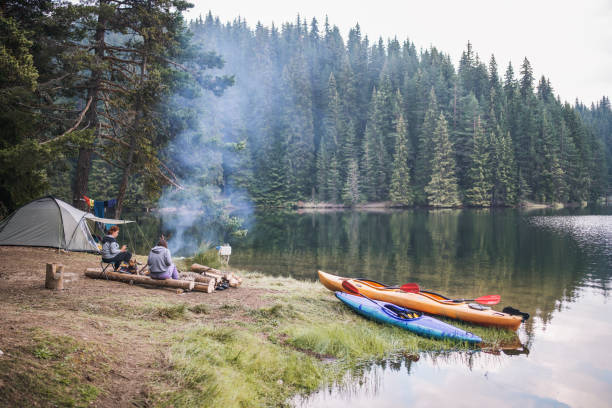
Summer Camping
Summer is undoubtedly the most popular time for camping, with warm temperatures and long daylight hours providing ample opportunities for outdoor activities. This season is ideal for families with children on summer break or those looking to enjoy water-based activities.
Pros of Summer Camping:
- Warm temperatures and longer daylight hours
- Wide range of outdoor activities available (swimming, hiking, fishing)
- Most campgrounds and facilities are fully operational
- Perfect for family vacations and group outings
Cons of Summer Camping:
- Crowded campgrounds and popular destinations
- Higher prices for campsites and outdoor gear
- Potential for extreme heat and humidity in some regions
- Increased risk of insect bites and encounters with wildlife
Summer camping is best for those who enjoy warm weather and don’t mind sharing popular destinations with other campers. It’s an excellent time for beach camping, lake activities, and exploring national parks. However, be prepared for larger crowds and book your campsites well in advance to secure your spot.
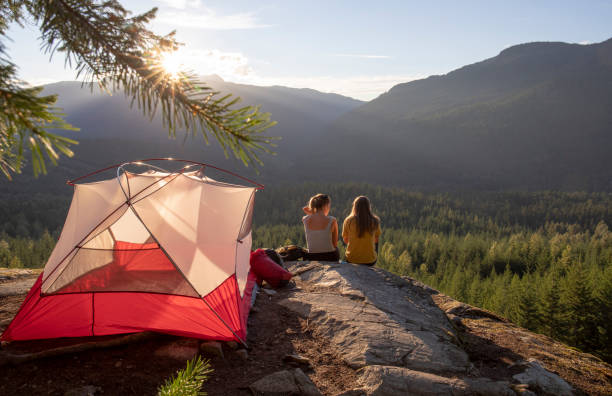
Fall Camping
Fall camping offers a unique and picturesque experience as nature transforms into a vibrant palette of autumn colors. This season provides comfortable temperatures and fewer crowds, making it an ideal time for those seeking a more tranquil outdoor experience.
Pros of Fall Camping:
- Comfortable temperatures with cooler nights
- Stunning fall foliage and scenic landscapes
- Fewer crowds and insects compared to summer months
- Ideal conditions for hiking and outdoor photography
Cons of Fall Camping:
- Shorter daylight hours
- Potential for sudden temperature drops and early snowfall in some regions
- Some campgrounds and facilities may begin to close for the season
Fall camping is perfect for those who appreciate cooler temperatures and breathtaking scenery. It’s an excellent time for activities such as leaf-peeping, stargazing, and enjoying cozy campfires. However, be prepared for colder nights and pack appropriate cold-weather gear to stay comfortable.
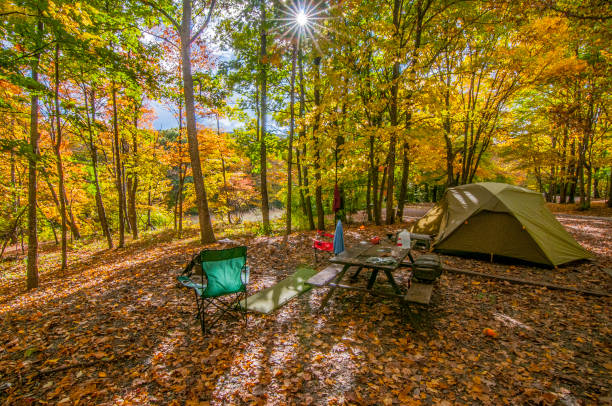
Winter Camping
Winter camping offers a unique and challenging experience for outdoor enthusiasts seeking to test their skills and enjoy the serene beauty of snow-covered landscapes. While not for everyone, winter camping can provide unforgettable memories and a true sense of adventure.
Pros of Winter Camping:
- Serene and peaceful surroundings
- Opportunity for winter sports (skiing, snowshoeing, ice fishing)
- Unique wildlife viewing opportunities
- Minimal crowds and insects
Cons of Winter Camping:
- Extreme cold temperatures and potential for severe weather
- Limited daylight hours
- Requires specialized cold-weather gear and equipment
- Many campgrounds and facilities may be closed for the season
Winter camping is best suited for experienced campers with proper cold-weather gear and knowledge of winter survival skills. It’s an excellent time for activities such as cross-country skiing, snowshoeing, and ice fishing. However, be prepared for challenging conditions and always prioritize safety when camping in winter environments.
Best Time to Go Camping
Weather Patterns and Climate Considerations
Understanding the weather patterns and climate of your chosen camping destination is crucial for planning a successful trip. Research average temperatures, precipitation levels, and potential weather hazards for the time of year you plan to camp.
- Consider using weather apps or websites to monitor long-term forecasts
- Be prepared for sudden weather changes, especially in mountainous regions
- Pack appropriate clothing and gear for the expected weather conditions
Personal Schedule and Availability
Your personal schedule and availability play a significant role in determining the best time to go camping. Consider factors such as work commitments, school schedules, and family obligations when planning your trip.
- Take advantage of long weekends and holidays for shorter camping trips
- Plan extended camping vacations during summer breaks or off-peak seasons
- Consider taking time off during shoulder seasons for a balance of good weather and fewer crowds
Destination-Specific Factors
Different camping destinations have unique characteristics that may influence the best time to visit. Research your chosen location to understand any specific factors that could impact your camping experience.
- National parks may have peak seasons with increased crowds and higher prices
- Coastal areas may experience hurricane seasons or periods of high surf
- Mountain regions may have limited access during winter months due to snow and ice
Camping Activities and Goals
The activities you plan to enjoy during your camping trip can help determine the best time to go. Consider the following factors when planning your trip:
- Water activities (swimming, kayaking, fishing) are best during warmer months
- Hiking and mountain biking may be more enjoyable during cooler seasons
- Winter sports enthusiasts should plan trips during snowy months
- Wildlife viewing opportunities may vary depending on migration patterns and seasonal behaviors

Best Times to Go Camping by Region
Northeast United States
- Spring: Late April to early June
- Summer: Mid-June to August
- Fall: September to mid-October
- Winter: December to February (for experienced winter campers)
Southeast United States
- Spring: March to early May
- Summer: Late May to early September (be prepared for heat and humidity)
- Fall: Late September to November
- Winter: December to February (mild in coastal areas, colder in mountainous regions)
Midwest United States
- Spring: Late April to early June
- Summer: Mid-June to August
- Fall: September to mid-October
- Winter: December to February (for experienced winter campers)
Southwest United States
- Spring: March to early May
- Summer: Late May to early September (avoid desert areas due to extreme heat)
- Fall: Late September to November
- Winter: December to February (ideal for desert camping)
Northwest United States
- Spring: Late April to early June
- Summer: Mid-June to August
- Fall: September to mid-October
- Winter: December to February (for experienced winter campers)
FAQs (Frequently Asked Questions)
Q: Is it safe to go camping during the off-season?
A: Camping during the off-season can be safe and enjoyable with proper planning and preparation. Research your destination, check weather forecasts, and ensure you have appropriate gear for the conditions. Be aware that some facilities may be closed or have limited services during off-peak times.
Q: What is the best time to avoid crowds when camping?
A: To avoid crowds, consider camping during shoulder seasons (spring and fall) or midweek during peak summer months. Weekdays are generally less crowded than weekends, and less popular destinations may offer a more secluded experience.
Q: How far in advance should I book a campsite for peak season camping?
A: For popular destinations during peak season (typically summer), it’s recommended to book campsites 6-12 months in advance. Some national parks and high-demand areas may require reservations up to a year in advance for prime dates.
Q: What is the best time to go camping for stargazing?
A: The best time for stargazing is during clear, moonless nights away from light pollution. Fall and winter often provide optimal conditions due to longer nights and clearer skies. Check lunar calendars and choose locations far from urban areas for the best stargazing experience.
Q: Are there any advantages to camping during the rainy season?
A: Camping during the rainy season can offer unique experiences, such as lush vegetation, flowing waterfalls, and fewer crowds. However, be prepared with appropriate rain gear, waterproof equipment, and knowledge of potential weather-related hazards.
Q: What is the best time to go camping for wildlife viewing?
A: The best time for wildlife viewing varies depending on the species and location. Generally, spring and fall offer opportunities to observe migratory birds and animals emerging from or preparing for hibernation. Research the specific wildlife in your chosen area to determine the optimal time for viewing.
Q: How can I prepare for unexpected weather changes during my camping trip?
A: To prepare for unexpected weather, pack versatile clothing layers, bring rain gear, and check weather forecasts regularly. Consider bringing a weather radio or using smartphone apps to stay informed about changing conditions. Always have an emergency plan in case of severe weather.
Q: Is it possible to go camping year-round in all regions?
A: While it’s possible to camp year-round in many regions, some areas may have seasonal closures or limited access due to weather conditions. Research your chosen destination and be prepared for the specific challenges of each season. Winter camping requires specialized gear and skills, so it’s not recommended for novice campers in extreme cold environments.
Final Words
Determining the best time to go camping depends on a variety of factors, including personal preferences, weather conditions, and destination-specific considerations. By understanding the pros and cons of camping during different seasons and taking into account factors such as crowd levels, wildlife viewing opportunities, and available activities, you can plan the perfect camping trip tailored to your needs and interests.
